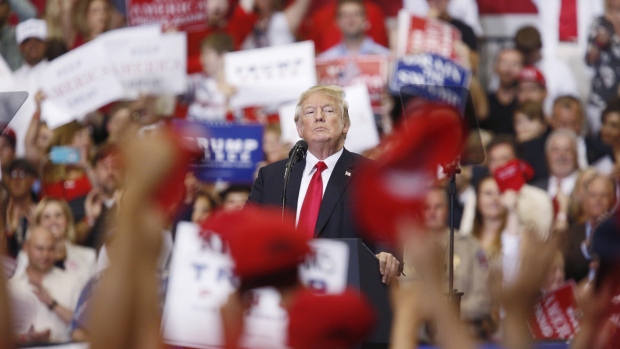Feb 18, 2019
Trump Courts 2020 Hispanic Vote in Miami With Venezuela Remarks
, Bloomberg News

(Bloomberg) -- President Donald Trump will demand that Nicolas Maduro leave power during a speech in Miami directed at two audiences: the generals keeping Venezuela’s authoritarian leader in office, and the tens of thousands of Venezuelan expatriates who may be key to the president winning Florida in 2020.
The remarks at Florida International University on Monday afternoon, in the heart of this immigrant community, come weeks after National Assembly leader Juan Guaido declared himself interim president and just days after the U.S. imposed new sanctions on five additional Maduro associates.
Guaido on Jan. 23 declared himself the country’s leader until a free election can be called, asking the Venezuelan military to help him, and saying Maduro’s 2018 re-election was illegitimate.
The U.S. has recognized Guaido and is pushing Venezuela’s military to get behind him as part of an international effort to force out Maduro. But Maduro is clinging to power, even as Trump’s envoy for Venezuela, Elliott Abrams, told Congress this month that the administration maintains “the current political and economic environment is unsustainable and he will not be able to weather it much longer.”
Trump’s Speech
In his State of the Union speech this month, Trump used Maduro’s example to caution against the perils of any kind of socialism, suggesting that liberal Democrats in the U.S. could threaten the American way of life. “We renew our resolve that America will never be a socialist country,” Trump said, message testing for his re-election campaign.
Trump’s speech in Miami will cap a Presidents’ Day holiday weekend spent at his Mar-a-Lago resort in Palm Beach and his nearby golf club, in a swing state where the Hispanic vote, including Venezuelan expats, is a key bloc.
Democrats have also eyed the Hispanic vote in Florida, especially the state’s growing Puerto Rican population. Trump was heavily criticized for his administration’s response to 2017’s Hurricane Maria, and thousands of residents who fled the island after Maria now reside -- and can vote -- in Florida.
The Venezuelan-American vote may provide Republicans a counterweight given the economic and humanitarian crises under Maduro and Trump’s willingness to respond.
Daniel Smith, chairman of political science at the University of Florida, said voter files from 2018 show that Venezuelan-American voters in Florida are a far smaller bloc than Cuban-American or Puerto Rican voters, but are a growing group with a high propensity to vote and whose loyalty is up for grabs.
Narrow Margins
Florida is a state where elections are often won or lost by the narrowest of margins. Of 14 million registered voters in Florida, about 36,000 self-identified as being born in Venezuela. Most live in Miami-Dade and Broward counties. And 65 percent turned out to vote.
That compared with 340,000 self-identified Cuban-born voters and 210,000 U.S. voters who said they were born in Puerto Rico.
While the conservative-leaning Cuban-American vote has historically kept the margin of Hispanic support for Democrats tighter in Florida than other states, it was particularly close in 2018 -- just 54 percent in the governor’s and U.S. Senate race, according to exit polling -- underscoring concerns for Democrats in 2020.
‘Illegitimate’ Leader
The Trump administration showed Venezuela’s state-owned oil giant, Petroleos de Venezuela SA, a path to escape U.S. sanctions on Friday when the U.S. Treasury said it would “consider lifting sanctions” on those who take concrete steps to “restore democratic order” in the country. At the same time, it imposed fresh penalties on five of Maduro’s close associates, including Venezuelan Oil Minister and PDVSA Chairman Manuel Quevedo.
The Treasury referenced “illegitimate former president” Maduro in a statement announcing the sanctions.
U.S. Senator Marco Rubio and Representative Mario Diaz-Balart, both Florida Republicans, traveled to the Colombia-Venezuela border on Sunday to visit aid facilities as cargoes with humanitarian resources arrive.
Guaido is counting on U.S.-backed shipments to persuade his country’s military to recognize him and create an opening for desperately needed relief, while Maduro has ordered his security forces to block supplies he says are a pretext for intervention by the Trump administration.
Garrett Marquis, a spokesman for National Security Adviser John Bolton, said Sunday on Twitter that the U.S. has pre-positioned nearly 200 tonnes of aid to help Venezuelans, and the international community has pledged over $100 million in support of the emergency response.
--With assistance from Saleha Mohsin, Nick Wadhams and Carolina Millan.
To contact the reporter on this story: Margaret Talev in Washington at mtalev@bloomberg.net
To contact the editors responsible for this story: Alex Wayne at awayne3@bloomberg.net, Ros Krasny, Virginia Van Natta
©2019 Bloomberg L.P.


